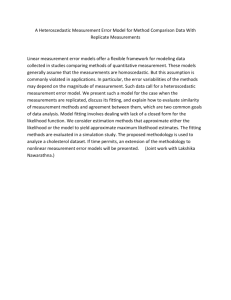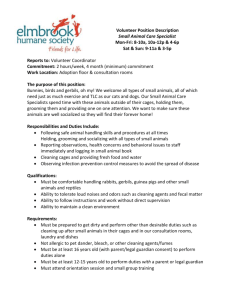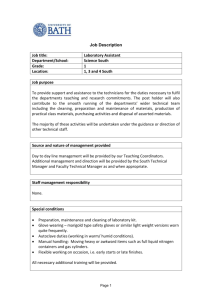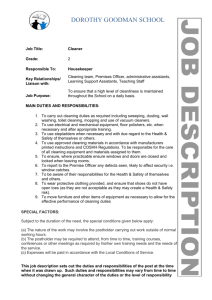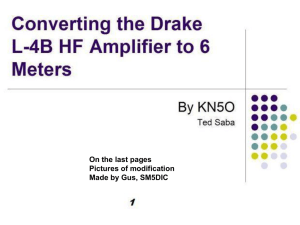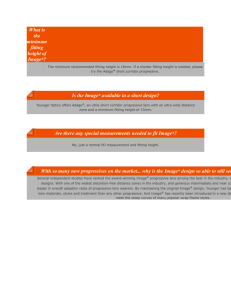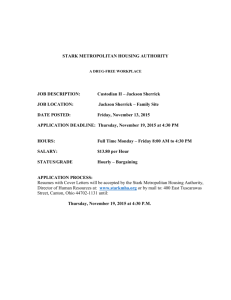Site Management Plan
advertisement
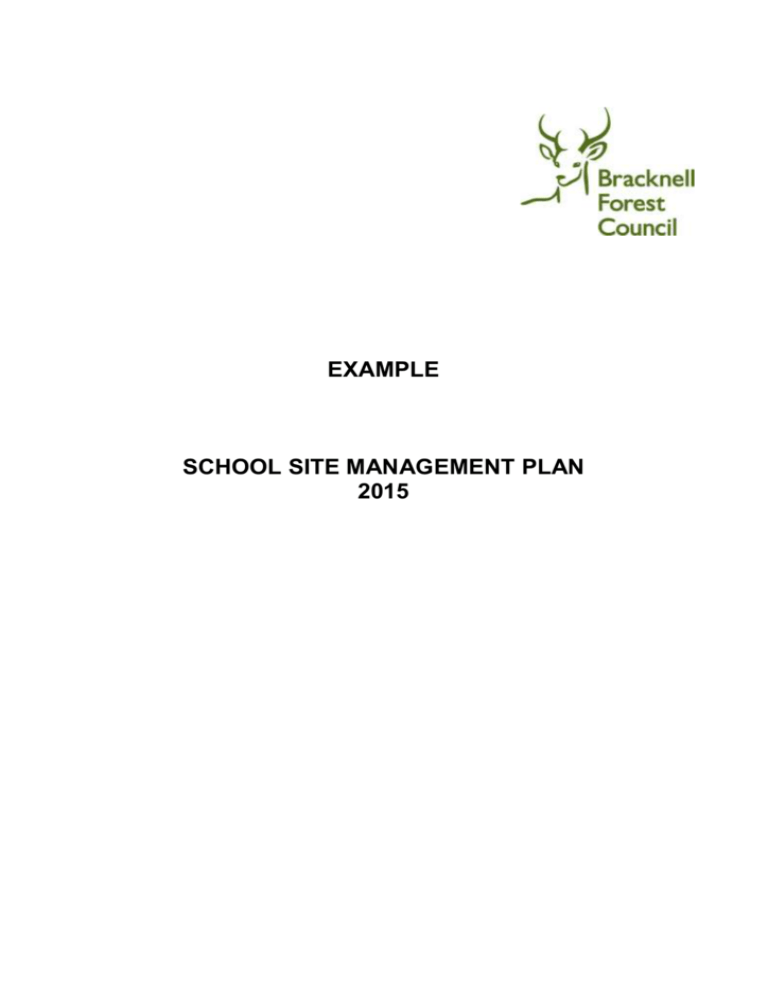
EXAMPLE SCHOOL SITE MANAGEMENT PLAN 2015 SITE DUTIES 1. SECURITY OF PREMISES 2. MONITORING AND CARE OF HEATING SYSTEMS 3. REPLACEMENT OF LIGHT BULBS/TUBES 4. GENERAL PORTERAGE 5. REPLACEMENT OF JANITORIAL CONSUMABLE ITEMS 6. HANDYPERSON DUTIES 7. FURNITURE HANDLING 8. CLEAN OUTSIDE AREA 9. LAUNDRY DUTIES 10. CLEANING DRAINS AND KITCHEN GREASE TRAPS 11. ANCILLARY DUTIES 12. INFREQUENT DUTIES GENERAL Needs differ from site to site therefore the Duties are not exhaustive, but are a guide to the range of duties that can be required of Site Managers/Site Controllers/Site Assistants/Caretakers and Assistants. Priorities will be determined at site level by the headteacher. Methods, materials, equipment and working conditions will be continually appraised by the Site manager with the object of introducing improvements. Standards shall be subject to day to day monitoring by the headteacher or their representative, and in accordance with this work specification. Questions about the cleanliness of the site should be addressed to the Contractor but any continuing difficulties shall be reported to the Site manager for rectification. Site Managers/Site Controllers/Site Assistants/Caretakers and Assistants may have delegated responsibility from Principals for monitoring the work standards of the contract Cleaning Service. Where due regard to safety is referred to this means familiarity with the broad requirements of the Health and Safety at Work Act 1974 and general precautions in handling chemical cleaning products. 1. SECURITY OF PREMISES Morning Unlock external entrance doors to College buildings. Switch off alarm system. Check security has not been violated; switch on lights and heaters as required. Unlock interior doors as necessary. Times should be to suit the needs of the establishment and by arrangement with the headteacher. End of Working Day Check all windows are closed and secured, and if necessary heat and light sources are extinguished. Set alarm system. Lock external entrance doors. Times should be to suit the needs of the establishment and by arrangement with the headteacher. Leave Arrangements Coincidental arrangements should be determined by liaison with the headteacher or his representative. 2. MONITORING AND CARE OF HEATING SYSTEMS All heating systems shall be maintained in accordance with the Country Heating Engineer’s following recommendations and with full regard to safety requirements, as follows: 2.1 Automatic Oil Fired Boilers Work Elements a) Check boilers for: Fuel/water leakage Not producing smoke Altitude and temperature gauges reading normally Temperatures comparable to weather conditions. Frequencies b) Check fuel contents gauges and record fuel consumed (oil) Three times per week c) Keep oil bunds free from litter Monthly d) Inspect feed and expansion tank, subject to accessibility Monthly e) Change pumps and motors over from ”standby” to duty Lubricate pumps and motors where appropriate equipment is provided Monthly Monthly f) Monthly Open and close all valves Daily Daily Daily Daily g) Order fuel as per re-ordering procedure As required h) Report any damaged insulation to Reactive Heating Engineers As necessary 2.2 Fan Convectors/Natural Gas Fired Room Heaters a) Switch on/off b) Check Temperature setting c) Externally clean heater Daily Daily Weekly 2.3 Calor Gas Heaters (Terrapins) a) Check temperature and time switch settings b) Check contents of gas cylinders and/or position of auto change over valve c) Order replacement gas cylinder d) Keep cylinder cabinets locked except for short periods prior to an arranged gas delivery e) Report any smells which may indicate leakage, and turn off at source Daily Daily Daily Daily Daily 2.4 Electric Fires a) Switch on/off b) Check for correct functioning c) Report faults 2.5 Radiators, Convectors, Pipe Coils Daily Daily As necessary a) Operate air release valve As required 2.6 Warm Air Heaters, Air Handling Units a) b) c) d) Switch on/off Check Temperature setting Externally clean heater Check control settings As required Daily Weekly Weekly For all systems generally, be aware, as far as is practical, of the positions of all isolating valves, connecting gas, oil and water Keep boiler and plant rooms clear of rubbish. 3 REPLACEMENT OR LIGHT BULBS/TUBES Replace when necessary, electric filament bulbs and fluorescent tubes and starters taking full account of safety requirements. 4 GENERAL PORTERAGE Receive, transport and store deliveries to establishments, and porter goods around the College site as necessary. 5 REPLACEMENT OF JANITORIAL COMSUMABLE ITEMS Responsibility for the distribution and replacement of soap, toilet rolls, or paper towels, and other consumable items from the site stock. 6 HANDYPERSON DUTIES The decision to undertake handyperson type duties in accordance with ability training and available tools/equipment, not on the following list will result from discussions between Site Manager/Site Controller/Caretaker Assistants, Assistant Site Assistants and the headteacher. If this fails to resolve the matter the Site Manager will liaise with Construction and Maintenance. Fitting/Repairing door furniture and fittings. Fitting/repairing shelving. Fitting pin board/notice boards to approved specification. Practical touch-up painting (internal). Replacement/repair of window latches (not metal frames). Repair wooden desks, benches. Fit/replace coat hooks. Repairs to wooden lockers, cupboards etc. Fittings towel dispensers. Fitting/repairing toilet roll holders. Fitting/repairing soap dispensers. Fitting sanitary towel dispensers. Fitting mirrors. Fitting/repairing shower curtain rails. Fitting/re-fitting toilet seats. Fitting/repairing toilet chains. Fitting/repairing toilet door bolts 7. FURNITURE HANDLING Daily set out, clear away and restack chairs, before and after assembly, for pupils who have lunches and for examinations, and any other special occasions, taking full account of safety requirements. Also, when required, move furniture between rooms, halls, corridors etc. 8. CLEAN OUTSIDE AREAS Collect litter from playground areas, empty litter bins, ensure that dustbin points are kept clean, and sweep excessive dirt and dust from all other hard areas. Sweep up and dispose of leaves from hard surface around the College/site. 9. LAUNDRY DUTIES Wash Site Assistant’s dusters and mops. Collect items to be sent outside launderers and distribute or store on their return. 10. CLEANING DRAINS AND KITCHEN GREASE TRAPS Drains shall be thoroughly brushed around the neck and afterwards flushed out with disinfectant solution. Where applicable, kitchen grease traps shall be cleaned weekly. 11. ANCILLARY DUTIES a) Take appropriate action and provide access for the emergency services in the event of fire, flood, breaking and entering, accident or other major incident. b) Ensure emergency exits are free of obstruction, correctly identified and operate. c) Maintain and adjust master clock systems according to manufacturers’ instructions. d) Be aware of the site’s electrical circuitry and fuse board layout. Replace fuses as necessary and report all faults to Reactive Electrical Engineers. e) Be aware, as far as is practical, of water and gas circuits and control valves, in order to operate them in cases of emergency. f) Provide access for contract-employed (or in-house) cleaning staff and secure premises following departure, within the normal working arrangements at each site. g) Ensure all Site and cleaning equipment is in a safe and working condition (visual check). Suspect equipment should be taken out of service and reported to the appropriate person. h) Undertake administrative duties relating to the supervision of other site staff and liaison with the contract cleaning Supervisor. i) Advise contractors on College/site layout including location of items to be repaired, and service points. Advise headteacher of, and when in charge of the site acts on, adverse conduct by contractors. 12. INFREQUENT DUTIES Some examples: Damp wipe waste paper bins. Call out by Police, Reactive Engineers, etc. Assist with the movement of furniture and equipment during construction/structural alterations. Clear up after flooding, fire etc. Clear snow from paths and take precautions against ice. Clean interior glass (excluding windows) e.g. Glass panelled doors. Emergency spot clean, including all areas when cleaners are not in attendance. Temporary repair of minor damage to building. Fitting/repairing plugs and chains to basins. Reaffix loose basins and, where appropriate, draining boards. Replacing odd wall tiles. Fitting/repairing Yale and simple mortice locks into an existing mortice. Temporary boarding-up of windows and securing after break-in. Removal of dangerous glass. Get keys cut. Moving and re-assembly of blackboards. Clean out gulleys. Re-washer taps. Repair leaking traps and waste pipes. Fix signs. Fitting/repairing gutters and drain pipes, work not exceeding 11 feet in height. Adjust overflow in toilets. Adjust automatic flushing cistern. Repair defective cisterns. Renew broken or missing gulley gratings and manhole covers to correct type. Inspection and general cleaning oil bunds. Patch plaster. Fitting/replacing curtain rails. The taking down and rehanging curtains. The fitting and taking down and/or re-hanging blinds (including Venetian blinds). Ensure the edges of carpets are secured to floor. Ensure carpet/linoleum jointing strips and or edging strips are firmly secured to floor. Bleed radiators when required. Sanding off and re-varnishing of wooden desks. Fitting and replacement of light diffusers, working up to 11 feet in height. Heating Fan convectors/natural gas fired room heaters – remove/replace guard/filter unit-vacuum clean or wash filter. Warm air heaters, air handling units-remove /replace guard/filter unit vacuum clean or replace with new.
